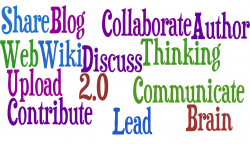learnonline
What is a Blog, how is it used?
An Overview of Blogs

A blog (a contraction of the term "Web log") is a Web site, usually maintained by an individual, with regular entries of commentary, descriptions of events, or other material such as graphics or video. Entries are commonly displayed in reverse-chronological order. "Blog" can also be used as a verb, meaning to maintain or add content to a blog.
Many blogs provide commentary or news on a particular subject; others function as more personal online diaries. A typical blog combines text, images, and links to other blogs, Web pages, and other media related to its topic. The ability for readers to leave comments in an interactive format is an important part of many blogs. Most blogs are primarily textual, although some focus on art (artlog), photographs (photoblog), sketches (sketchblog), videos (vlog), music (MP3 blog), audio (podcasting), which are part of a wider network of social media.
Source: http://en.wikipedia.org/wiki/Blog
Some Blogs, for example that of George Siemens are used for professional exchanges of knowledge, contain links to contemporary events, conferences, publications etc.
Stephen Downes explains uses of educational blogging - yet blogs and wikis are currently blocked in most schools - what are your thoughts on that? It would be interesting to add to a PMI chart (see my wikispace for details) to analyse objectively the dangers and the benefits of using blogs in schools.
Should you wish to explore blogging, a number of options are available to you: for example try Google's Blogger.
If you are a teacher, Education Queensland providies a set of blogging (and other) tools in secure environments thr0ugh the Learning Place.
Blogs for Learning
Only the author of the blog can edit information. Visitors can, however, respond and post comments which will set up a dialogue between individuals. What sort of learning strategies would suit this type of Communication tool?
Consider my brainstorm around the use of Blogs - I have chosen to scaffold it by identifying the key features and mapping that to potential uses of each. However, I have chosen a Wiki to do this - what are the benefits of using a Wiki rather than a Blog for this purpose? I will leave you to review the characteristics of a Wiki and then answer that question yourself!
What does this brainstorm tell me? I would prefer to use a Wiki for collaborative projects, unless it was an expert jigsaw type activity in which each individual's contribution is a stand-alone. The formatting makes it ideal for scaffolded exploration and construction of a product. It is also ideal for assignment construction, in which feedback is given and acted upon in a sequential way. It is a great reflection tool, also an ideal tool for individual development of critical thinking around a concept.
How could you use a Blog to support learning?